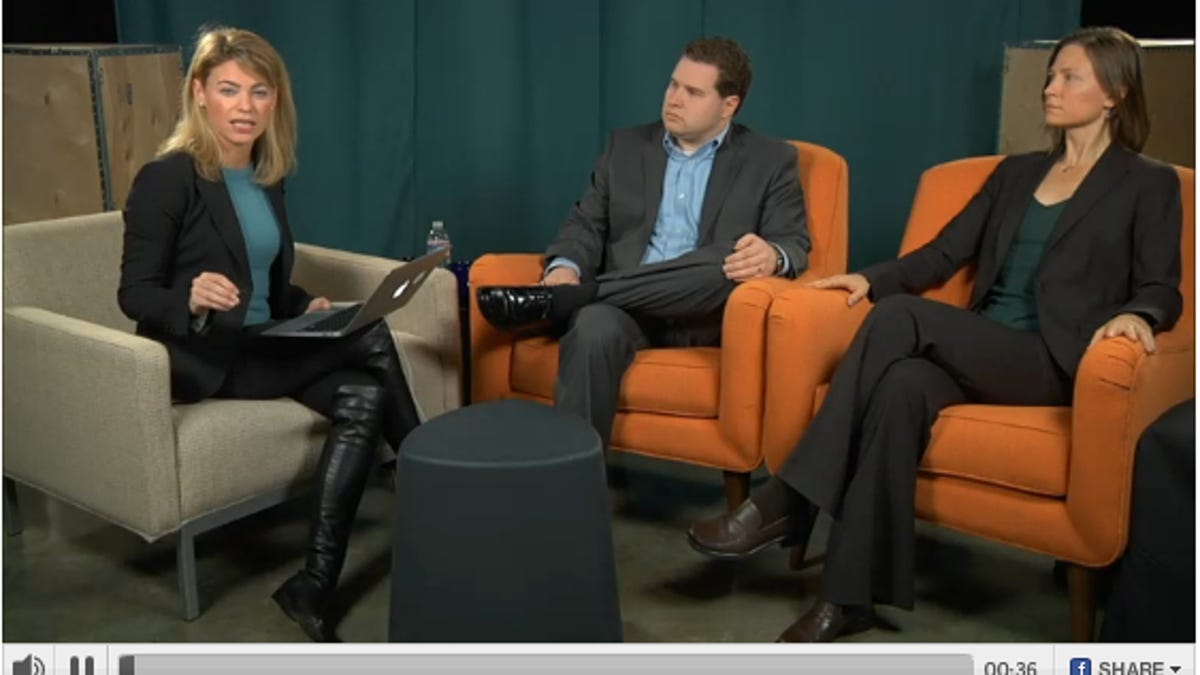Facebook users seek answers on advertising, privacy
During the open period for voting on changes in Facebook's data use policy, the company's privacy executives field questions in a live Web Q&A -- but don't explain much.

When given the opportunity to question those who lead Facebook's privacy team about proposed changes to the social network's data use policy before voting on the matter, Facebook users were more concerned with how the site currently manages its data.
Questions during today's half hour live Web talk (archived here) included ones about how posts on Timeline are displayed, what information is shared with advertisers, online bullying, what happens if your account is hacked and, of course, what about that viral copyright post. (It's fake.) One user wasn't even sure there was a vote: "Is there a vote going on? Where should I go? And, what should I know?"
Facebook users have until Monday at noon to vote on a number of proposed policy changes that affect how Facebook governs its site. These include how Facebook handles your data when it comes to privacy and advertising, and a plan to abolish the social network's practice of allowing users to vote on policy changes in the first place.
Some users did ask about the changes, but the executives didn't really go beyond the language in the proposed documents. They did offer one helpful tip: users can see all the changes highlighted in the redline version of documents posted to the Facebook Site Governance page. These versions show the changes in red type.
During the Web talk, one user asked about changes in the personalized ads policy, which specifically mentions more personal information like religion, health status, or political views and seeing ads related to the topic.
Katherine Tassi, head of data protection at Facebook Ireland (Facebook's global headquarters that handles privacy for all countries outside of North America), said the additional language is suppose to make the company's policy clear, not give advertisers access to your sensitive information. She said Facebook's policy already states that it will show you ads that are related to things you like as a way of letting advertisers target specific demographics based on information like age, sex, location, and likes.
"I think we've been perfectly clear with users that we have to show advertising in order to make money in order to provide the Facebook service, the only thing we were trying to do was to provide clarification," she said, adding that advertisements will not reflect a users' specific information like religion or political stance.
Rob Sherman, Facebook's manager of privacy and public policy, also emphasized that Facebook does not sell your information to advertisers -- it makes money off your information by using it to target advertising. Advertisers tell Facebook what demographic they would like to reach and then Facebook makes sure the ad gets in front of those people.
Another user asked the team to explain the new language about hiding things on Timeline that still show up elsewhere. In the proposed document, Facebook includes a new sentence explaining who can see your "hidden" posts. Sherman basically repeated the new language, which reads:
When you hide things on your timeline, like posts or connections, it means those things will not appear on your timeline. But, remember, anyone in the audience of those posts or who can see a connection may still see it elsewhere, like on someone else's timeline or in search results. You can also delete or change the audience of content you post
Sherman and Tassi were also asked about sharing with affiliates. The new language reads:
We may share information we receive with businesses that are legally part of the same group of companies that Facebook is part of, or that become part of that group (often these companies are called affiliates). Likewise, our affiliates may share information with us as well. This sharing is done in compliance with applicable laws including where such applicable laws require consent. We and our affiliates may use shared information to help provide, understand, and improve our services and their own services.
Tassi said this is "a standard provision" that most companies have, and covers the sharing of data between Facebook Inc. (the North America entity) and Facebook Ireland. She didn't address the sharing of data between Facebook and other affiliates like Instagram, which Facebook bought earlier this year.
"In order to provide the services efficiently and effectively, it requires the shared information between affiliates, she said.
None of the questions Facebook answered addressed the concerns presented by two privacy watchdogs. Both the Electronic Privacy Information Center and the Center for Digital Democracy think Facebook's new proposed changes break the terms of a settlement between the FTC and the social network.
Under the terms, Facebook agreed to provide users with "clear and prominent notice" anytime their information is shared, and obtain its users' "express consent" before sharing any information that exists outside the auspices of its privacy settings.

